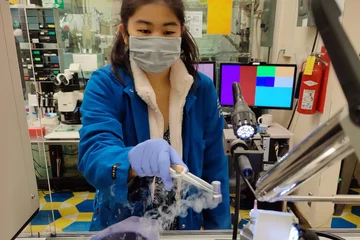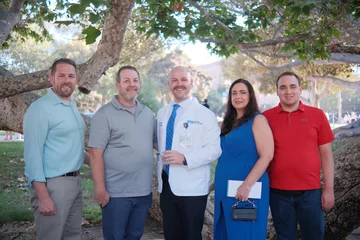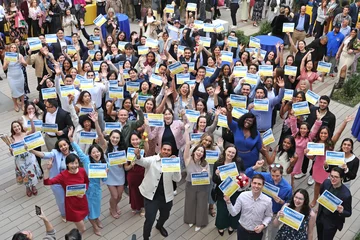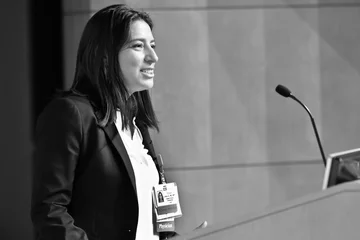Dr. Lisa Nicholas leads task force to treat health inequity issues

The UCLA clinical professor trains medical students and hopes to inspire other people of color in the field.
Ever since she was 10 years old, Lisa Nicholas knew she wanted to be a doctor after being treated by Dr. Lydia Wright, a female pediatrician.
As the first Black pediatrician in Buffalo, Wright garnered respect from the community. But the fact that Nicholas was being treated by a woman of color showed the young girl that she, too, could follow her doctor’s footsteps.
Now an associate clinical professor in the UCLA Department of Obstetrics and Gynecology, Nicholas has been a practicing physician for 30 years. She’s always believed in providing equal care to all communities. But in 2020, after George Floyd’s killing and the health inequities highlighted by the COVID-19 pandemic, she felt compelled to create a task force focused on justice, equity, diversity and inclusion.
“I have been inspired to be a leader and try to provide a reckoning for many of the wrongs as it relates to health inequities and in social justice, and that not only encompasses how we supervise our doctors in training, but the expectations we have of one another’s faculty members,” Nicholas said.
The task force aims to recruit and maintain diverse faculty and staff in the department, and raise awareness of implicit bias and microaggressions. Last year, it began offering a scholarship program that provides a three-week sub-internship for medical students from underrepresented backgrounds.
“Dr. Nicholas’ leadership represents a change in the health of our departments in that it is much more open and way more holistic and thoughtful about our students, patients, and colleagues. It’s a form of outlook that we didn’t have in the past,” said her colleague, Dr. Angela Chen.
Since the task force launched, Chen says, more residents have gotten involved in equity diversity and inclusion projects.
For instance, UCLA’s OB-GYN department earlier this year hosted a discussion with artist Michelle Browder in honor of women’s history month. Browder, a Black artist, created statues of enslaved women who were subjected to experimental surgeries without anesthesia. She hopes the monument, called “The Mothers of Gynecology,” brings attention to the sacrifices the women made.
A passion for educating medical students
Nicholas, who worked at community health centers in Buffalo and Los Angeles before joining UCLA Health in 2010, has become a leader in medical education. She was first appointed to medical director and was promoted to clerkship director a few years later.
“The energy that young people have in their eagerness, enthusiasm, and high desire for learning inspires me to share everything that I have so I can grow with them,” she said.
Nicholas’ efforts reach well beyond UCLA, too. The department has teamed up with a nonprofit to raise awareness about healthcare career opportunities for minority youth. And prior to the pandemic, Nicholas and other UCLA volunteers traveled to Uganda to provide reproductive health care for women.
Nicholas developed a gynecologic surgical curriculum for medical residents in Uganda, who then go on to help train doctors in other African countries such as the Congo, Ethiopia and South Sudan, creating a ripple effect of impact.
“It’s been inspirational to see her passion energy and the effort that she puts into that. And she’s made it possible,” said Dr. Christopher Tarnay, a colleague who also went to Uganda to provide care.
Why representation matters
When Nicholas started medical school at Boston University, she wanted to become a pediatrician, just like Wright. But as she continued training, her goal shifted to taking care of women during pregnancy and birthing. Patients told her they were better able to connect with a female doctor in what at the time was a male-dominated field.
But the road to being a leader in the OB-GYN department was not easy. Being a woman of color in a room full of males throughout her education and training left Nicholas sometimes feeling excluded and unaccepted.
Despite the challenges Nicholas faced on her medical journey, she now stands as a proud role model for future generations of women of color.
“People respond to individuals that are relatable because it allows us to really see what is possible. If you don’t see that in the scheme of choices that you have in your life, it becomes more difficult for one to open up their imagination,” she said.
And Nicholas has no plans on slowing down on her diversity and education efforts — the impact she has on others keeps her motivated.
“Just seeing the responsiveness of other people diving in and expanding their efforts working on health care disparities and health injustice is an inspiration to me, because if I feel I can ignite a fire with other people that help me to keep the flame going as well,” she said.



